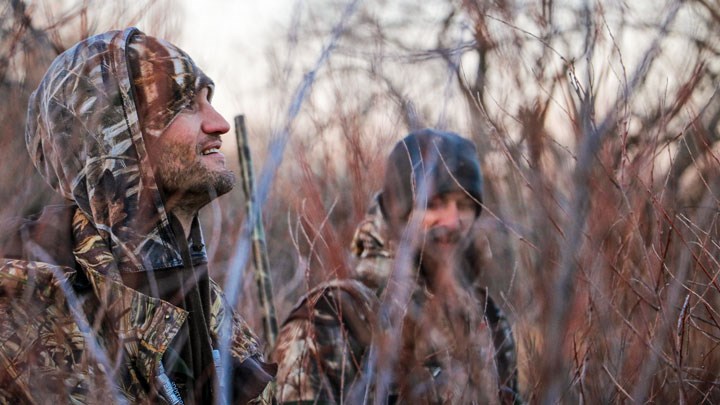
by Peter Churchbourne, Director of Fundraising, NRA Hunters’ Leadership Forum - Thursday, March 4, 2021

There are two ways to promote and defend hunting in the United States. The first is to foster active participation in hunting. The second is to maintain, protect and enhance the cultural acceptance of hunting. The first cannot exist without the second. Today numerous organizations across the country work to increase hunting participation and to develop programs to recruit, retain and reactivate hunters, otherwise known as the R3 movement. These organizations include state fish and wildlife agencies, sportsmen and conservation non-governmental organization (NGO’s) and the Council to Advance Hunting and Shooting Sports (CAHSS). In fact, CAHSS developed a plan to promote participation in hunting that has gained traction and is helping to hold the line on the loss of hunter numbers. However, almost no effort is directed at the protection and maintenance of the cultural acceptance of hunting in America. Without these, efforts to recruit, retain and reactivate hunters is wasted. Hunters in the United States represent less than 5 percent of the country’s population. Without excellent representation of who we are and the great things we do for conservation and the economy, our future lays in the hands of people who do not hunt or understand our positive contributions.
The reputation of hunting remains vulnerable to setbacks in the court of public opinion. Social media missteps, high-profile hunting incidents covered exhaustively in the media and outright falsehoods perpetuated by animal rights extremists’ interests continue to jeopardize the future of hunting in the United States. There is a pressing need for action, based on a solid foundation of research, with effective pro-hunting messaging appealing to shared values, common sense and scientific wildlife management principles. Unfortunately, too much of the little work being done by sportsmen’s and conservation NGO’s to defend hunting and communicate its benefits is not based on research. Further, it tends to lack coordination. What is needed is action, based on research, with strategic direction on how to communicate with the public about hunting.
Fear not: There is action on this front in the hunting community to help put a strategic direction on disseminating the right information and messaging. Over the last five years, the NRA Hunters’ Leadership Forum (HLF) has collaborated with the leading outdoor industry research company, Responsive Management, on groundbreaking new studies examining Americans’ attitudes towards hunting and hunters. With additional consultation from some of the country’s top debate strategists and communications specialists, the partners have distilled the findings and recommendations into a convenient, accessible, easy to digest book explaining how to communicate with the American public about hunting. Developed specifically for wildlife and conservation professionals, the book details how to build support for hunting in the most persuasive and compelling ways possible. Soon the NRA HLF will be providing virtual seminars to hunting industry professionals so that they can get the most from the research in hopes that the information will make its way into future communication and marketing strategies. Plans are also in place to educate hunters directly and arm them with information so they can work to protect their future rights themselves as they engage nonhunters in their lives. After all, we are our own best advocates when we are confident and comfortable talking about our passion.
Editor's Note: In giving credit where it is due, this article is based on the NRA Hunters' Leadership Forum's (HLF) 2016 groundbreaking research project gauging public perceptions toward hunters, hunting and animal welfare. The research, conducted for the NRA HLF by Responsive Management, was compiled and released in the NRA's 2020 HLF-funded book, "How to Talk about Hunting: Research-Based Communications Strategies," teaching hunters to be tactical, practical communicators in talking with non-hunters and sharing the hunter's story. While hunting is the foundation of America’s world-renown wildlife conservation success story—the North American Model of Wildlife Conservation—we hunters recognize that legal, regulated hunting in the 21st century faces cultural, political, demographic and social challenges that previous generations of hunters never could have imagined. For more information on the NRA research and book, please click on this link: "How to Talk about Hunting: Research-Based Communications Strategies."—Karen Mehall Phillips, Director of Communications, NRA HLF
About the Author
Peter Churchbourne is an avid outdoorsman, conservationist and steadfast advocate for all hunters. His passion is anything to do with the outdoors, but most important to him is hunting waterfowl with his Labs, chasing turkeys, bowhunting and introducing new people to life outdoors. Peter is currently a director with the NRA HLF where he is engaged in building new NRA hunting programs and fighting for hunters' rights.
About the Voice of Leadership Panel
Facilitated by James “Jay” Pinsky, editor of The Hunting Wire, and Peter Churchbourne, a director with the NRA HLF, the Voice of Leadership Panel (VLP) is an appointed six-member group of outdoor industry leaders dedicated to sharing their voices on key hunting and outdoor recreation issues to inform, inspire and educate the hunting community. Appointed for a one-year term, VLP panelists will address key hunting topics and provide leadership-based digital content to be featured on The Hunting Wire and the NRA Hunters’ Leadership Forum website, NRAHLF.org.
Members of the 2020-2021 VLP include:
Jim Curcuruto, Hunting and Firearm Industry Consultant formerly with the National Shooting Sports Foundation
Mandy Harling, National Director of Hunting Heritage Programs, National Wild Turkey FederationJenifer Wisniewski, Chief, Outreach and Communication, Tennessee Wildlife Resources Agency
Jess Johnson, Legislative and Advocacy, Wyoming Wildlife Federation
Joel Brice, Vice President, Waterfowl & Hunter Recruitment Programs, Delta Waterfowl
David Baxter, Educator, Texas Youth Foundation, Texas Youth Hunting Program
E-mail your comments/questions about this site to:
[email protected]
Proudly supported by The NRA Foundation and Friends of NRA fundraising.
